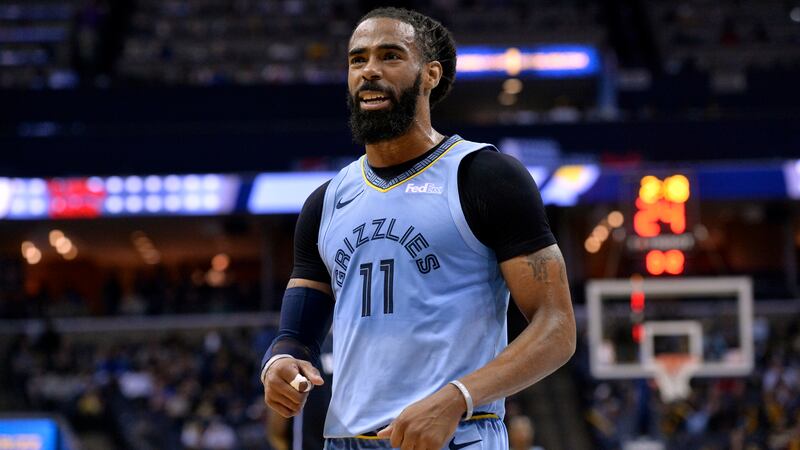SALT LAKE CITY — Two summers ago, Utah was a glum place. Gordon Hayward was off to Boston. Donovan Mitchell was just a concept. Optimism was out, cynicism was in.
The most sunny Jazz fans could only trust in Rudy Gobert, who said things would be fine. And they were. But Wednesday the picture got far better.
Lemonade, anyone?
It’s not just that Mike Conley will be a major upgrade at point guard. It’s a message that the Jazz intend on contending, not just treading water.
Says who?
Says the $67 million remaining on Conley’s contract. That’s almost exactly the original cost of the arena the Jazz call home. The Conley acquisition, in exchange for Jae Crowder, Kyle Korver, Grayson Allen and two first-round draft picks is a high price, but it strengthened a signal that sometimes seemed to waver.
The Jazz said they don’t merely want to survive; they want to win big.
Today.
“We want to move the group forward,” team executive Dennis Lindsey said at the postseason media review. “And while we have a very good team, the results told us that we don’t have great team.”
They still probably don't. Good as Gobert, Conley and Mitchell are, none has yet attained All-Star status. But if the team gets off to a fast start next season, that will change.
The Conley acquisition doesn’t come without risk. He’ll be 32 in October, which means his peak athleticism is behind him. He missed all but 12 games in 2017-18 with an Achilles injury, but played 70 games last year. Still, last year he averaged a career-high 21 points, along with 1.3 steals and 6.4 assists. Equally important is that he’s a career 37.5 percent 3-point shooter.
It has been a drawback for the Jazz that they didn’t have an everyday scorer besides Mitchell, and they didn’t have enough outside shooting. Conley covers both.
Although the Jazz were never in contention for top free agents like Klay Thompson, Kevin Durant or Kawhi Leonard, or in position to trade as the Lakers did for Anthony Davis, they have always maintained they can attract players that not only fit the system, but produce. Bringing in Crowder and Korver were nice accent pieces, but not game-changers.
Does this mean the Jazz will overtake the Warriors? A lot of teams might, if things go south with Durant and Thompson. Meanwhile, Jazz nemesis Houston has plateaued and is looking for change. Denver, Oklahoma City, Portland, San Antonio and the Clippers aren’t likely to go away.
The Lakers also are going places.
But the Jazz aren’t wringing their hands. That sometimes seemed the case through the first years after they reached the NBA Finals. But the acquisition of Carlos Boozer and Deron Williams hinted that the Jazz were more than everyone’s good-natured pal.
This summer, free agents such as Tobias Harris, Jimmy Butler, Khris Middleton and D’Angelo Russell have been linked to possible Jazz moves, but Conley’s arrival ended that. The trade left the Jazz with just a second-round pick in Thursday’s draft, the 53rd slot.
Conley isn’t the best point guard in the league, the top shooter or the finest defender. But he’s an upgrade over Ricky Rubio.
Gobert has two years left on his contract and Mitchell essentially three. The Jazz have a narrow window of opportunity. Conley won’t likely be near the same player in two years, but there’s no certainty Gobert and Mitchell will remain with the Jazz.
The best way to ensure they stay is to give them hope. So the organization is putting on its best “win now” face.
Conley becomes the Jazz’s highest-paid player. That’s not a timid trade to make. Someone's commitment to almost anything can be measured in large part by how much he or she is willing to pay for it. In acquiring Conley, the Jazz showed their seriousness.
There is steel in those small-market smiles.


